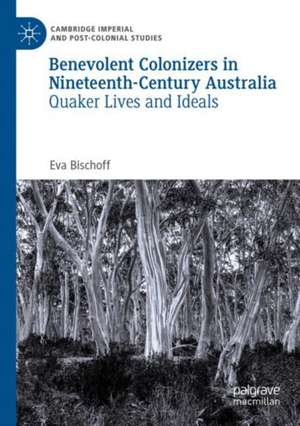Benevolent Colonizers in Nineteenth-Century Australia: Quaker Lives and Ideals: Cambridge Imperial and Post-Colonial Studies
Autor Eva Bischoffen Limba Engleză Paperback – 26 aug 2021
| Toate formatele și edițiile | Preț | Express |
|---|---|---|
| Paperback (1) | 587.02 lei 6-8 săpt. | |
| Springer International Publishing – 26 aug 2021 | 587.02 lei 6-8 săpt. | |
| Hardback (1) | 599.00 lei 6-8 săpt. | |
| Springer International Publishing – 30 ian 2020 | 599.00 lei 6-8 săpt. |
Din seria Cambridge Imperial and Post-Colonial Studies
-
 Preț: 397.09 lei
Preț: 397.09 lei - 20%
 Preț: 755.49 lei
Preț: 755.49 lei - 23%
 Preț: 642.53 lei
Preț: 642.53 lei -
 Preț: 196.85 lei
Preț: 196.85 lei -
 Preț: 381.21 lei
Preț: 381.21 lei - 17%
 Preț: 491.70 lei
Preț: 491.70 lei - 18%
 Preț: 894.46 lei
Preț: 894.46 lei - 18%
 Preț: 774.83 lei
Preț: 774.83 lei -
 Preț: 280.10 lei
Preț: 280.10 lei - 18%
 Preț: 733.78 lei
Preț: 733.78 lei - 9%
 Preț: 625.46 lei
Preț: 625.46 lei -
 Preț: 386.11 lei
Preț: 386.11 lei - 18%
 Preț: 782.87 lei
Preț: 782.87 lei -
 Preț: 389.70 lei
Preț: 389.70 lei - 15%
 Preț: 644.18 lei
Preț: 644.18 lei - 15%
 Preț: 500.73 lei
Preț: 500.73 lei - 15%
 Preț: 640.37 lei
Preț: 640.37 lei -
 Preț: 396.40 lei
Preț: 396.40 lei -
 Preț: 390.63 lei
Preț: 390.63 lei - 15%
 Preț: 642.03 lei
Preț: 642.03 lei -
 Preț: 387.96 lei
Preț: 387.96 lei -
 Preț: 385.47 lei
Preț: 385.47 lei - 15%
 Preț: 640.37 lei
Preț: 640.37 lei -
 Preț: 390.63 lei
Preț: 390.63 lei -
 Preț: 389.88 lei
Preț: 389.88 lei -
 Preț: 385.08 lei
Preț: 385.08 lei -
 Preț: 393.52 lei
Preț: 393.52 lei -
 Preț: 390.63 lei
Preț: 390.63 lei -
 Preț: 491.01 lei
Preț: 491.01 lei - 18%
 Preț: 1000.56 lei
Preț: 1000.56 lei - 15%
 Preț: 643.34 lei
Preț: 643.34 lei -
 Preț: 390.63 lei
Preț: 390.63 lei - 15%
 Preț: 699.93 lei
Preț: 699.93 lei -
 Preț: 384.70 lei
Preț: 384.70 lei - 18%
 Preț: 894.46 lei
Preț: 894.46 lei - 15%
 Preț: 645.79 lei
Preț: 645.79 lei - 15%
 Preț: 693.71 lei
Preț: 693.71 lei -
 Preț: 384.31 lei
Preț: 384.31 lei - 15%
 Preț: 641.20 lei
Preț: 641.20 lei -
 Preț: 394.51 lei
Preț: 394.51 lei -
 Preț: 382.36 lei
Preț: 382.36 lei -
 Preț: 395.47 lei
Preț: 395.47 lei - 18%
 Preț: 1004.48 lei
Preț: 1004.48 lei - 15%
 Preț: 648.89 lei
Preț: 648.89 lei
Preț: 587.02 lei
Preț vechi: 690.62 lei
-15% Nou
Puncte Express: 881
Preț estimativ în valută:
112.34€ • 121.98$ • 94.37£
112.34€ • 121.98$ • 94.37£
Carte tipărită la comandă
Livrare economică 23 aprilie-07 mai
Preluare comenzi: 021 569.72.76
Specificații
ISBN-13: 9783030326692
ISBN-10: 3030326691
Pagini: 404
Ilustrații: XVII, 404 p. 23 illus., 17 illus. in color.
Dimensiuni: 148 x 210 mm
Greutate: 0.5 kg
Ediția:1st ed. 2020
Editura: Springer International Publishing
Colecția Palgrave Macmillan
Seria Cambridge Imperial and Post-Colonial Studies
Locul publicării:Cham, Switzerland
ISBN-10: 3030326691
Pagini: 404
Ilustrații: XVII, 404 p. 23 illus., 17 illus. in color.
Dimensiuni: 148 x 210 mm
Greutate: 0.5 kg
Ediția:1st ed. 2020
Editura: Springer International Publishing
Colecția Palgrave Macmillan
Seria Cambridge Imperial and Post-Colonial Studies
Locul publicării:Cham, Switzerland
Cuprins
1. Introduction.- 2. Violence and Pacifism: Writing the History of the Anglo-World from within.- 3. A Peculiar People: Quakers and the Atlantic World around 1800.- 4. Quakers in Early Nineteenth-Century Van Diemen’s Land.- 5. The Case of James Backhouse and George W. Walker: Quaker Ministers and Colonial Governmentality, 1834.- 6. Being at Home: Van Diemen’s Land as a Quaker Settler Space.- 7. The Case of Francis Cotton and George F. Story: Quaker Settlers and the Tasmanian Frontier, 1829-1831.- 8. Removal, Reform, Protection: Building a Humanitarian Empire.- 9. Tasmanian Lessons: Translation of Quaker Experiences and Concepts, 1836-1843.- 10. Conclusion.-
Recenzii
“Bischoff herself details the book's contributions to three academic fields, namely: settler colonial studies, the history of humanitarianism and genocide studies … . This monograph demonstrates a broad grasp of the subject matter and places a new light on the Quakers as well as underscoring the connection between humanitarianism and imperialism in the early 19th-century British world.” (Felicity Jensz, Anglistik, Vol. 32 (1), 2021)
Notă biografică
Eva Bischoff is Assistant Professor of International History at Trier University, Germany. Her research interests include Colonial and Imperial History, Postcolonial Studies, Settler Colonial Studies as well as Gender/Queer Studies.
Textul de pe ultima copertă
This book reconstructs the history of a group of British Quaker families and their involvement in the process of settler colonialism in early nineteenth-century Australia. Their everyday actions contributed to the multiplicity of practices that displaced and annihilated Aboriginal communities. Simultaneously, early nineteenth-century Friends were members of a translocal, transatlantic community characterized by pacifism and an involvement in transnational humanitarian efforts, such as the abolitionist and the prison reform movements as well as the Aborigines Protection Society. Considering these ideals, how did Quakers negotiate the violence of the frontier? To answer this question, the book looks at Tasmanian and South Australian Quakers’ lives and experiences, their journeys and their writings. Building on recent scholarship on the entanglement between the local and the global, each chapter adopts a different historical perspective in terms of breadth and focused time period. The study combines these different takes to capture the complexities of this topic and era.
Caracteristici
Focuses on the history of a group of British Quaker families and their involvement in settler colonialism in early nineteenth-century Australia Explores the tension between the humanitarian ideals held by Quakers and their everyday actions which contributed to practices which displaced and annihilated Indigenous communities Combines micro-historical analysis of these Quaker families with a reconstruction of the multi-layered and interconnected global networks that shaped these settlers’ lives
